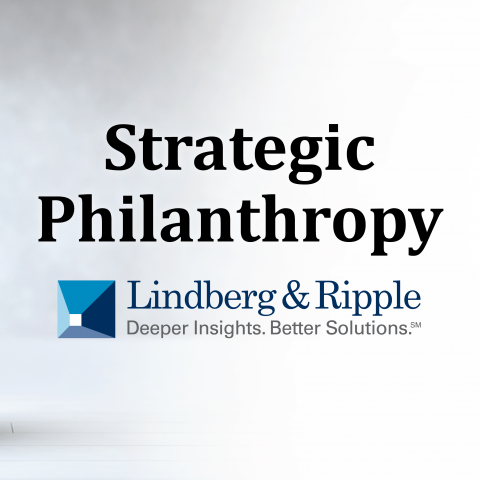Strategic Philanthropy: Maximizing Impact Through Donor-Advised Funds and Private Foundations
At Lindberg & Ripple, we believe that true wealth extends beyond financial success—it’s also about making a meaningful impact on the world. For many high-net-worth individuals, philanthropy is a central component of their legacy. But effective philanthropy requires more than just generosity; it requires strategic planning. In this blog, we’ll explore two advanced philanthropic tools—donor-advised funds (DAFs) and private foundations—and how they can be integrated into a broader wealth management plan to maximize impact.
The Power of Strategic Philanthropy
Philanthropy is not only a way to give back; it can also be a key element in managing and preserving wealth. Strategic philanthropy involves careful planning and execution to ensure that your charitable giving aligns with your broader financial goals, providing benefits both to the causes you care about and to your overall wealth management strategy.
Two of the most powerful tools for strategic philanthropy are donor-advised funds and private foundations. Each offers unique advantages, and the right choice depends on your personal goals, the level of control you desire, and the complexity of your charitable activities.
Donor-Advised Funds: Flexibility and Simplicity
A donor-advised fund (DAF) is a charitable giving vehicle that allows you to make a charitable contribution, receive an immediate tax deduction, and then recommend grants to charities over time. DAFs offer several key benefits:
- Tax Efficiency: Contributions to a DAF are tax-deductible in the year they are made, which can be particularly advantageous in high-income years. Additionally, any investment growth within the DAF is tax-free, allowing more funds to be available for future grants.
- Simplicity and Flexibility: DAFs are easy to establish and manage, providing a simple way to support multiple charities without the administrative burden of a private foundation. You can contribute to the fund, allow it to grow, and recommend grants to your chosen charities when the time is right.
- Anonymity: If desired, donations can be made anonymously, providing privacy in your giving.
- Strategic Timing: You can contribute to the DAF in a high-income year for maximum tax benefit and then take your time to decide which charities to support, giving you flexibility in your philanthropic decisions.
DAFs are ideal for those who want to be charitable but prefer not to manage the complexities of a private foundation. They provide flexibility, tax efficiency, and the ability to engage in strategic giving without the need for extensive resources or administration.
Private Foundations: Control and Legacy Building
For individuals or families with a long-term philanthropic vision and the desire for greater control, a private foundation may be the best choice. A private foundation is a tax-exempt organization that you establish, fund, and manage. While they come with more complexity and regulatory requirements, private foundations offer several significant advantages:
- Control and Customization: With a private foundation, you have complete control over how funds are managed, invested, and distributed. This allows for highly customized grantmaking, support for specific causes, and the ability to make grants to individuals or organizations that might not qualify for traditional DAFs.
- Legacy Creation: A private foundation can serve as a lasting legacy, continuing your charitable work for generations. Many families use foundations as a way to involve younger generations in philanthropy, teaching them the importance of giving back and managing wealth responsibly.
- Expanded Grantmaking Options: Private foundations have more flexibility in grantmaking, including the ability to make international grants, fund scholarships, or even operate their own charitable programs.
- Recognition: Unlike DAFs, private foundations often bear the family name and can provide a public platform for your philanthropic efforts, enhancing your legacy and influence.
While private foundations require more commitment, they are an excellent choice for those who wish to have a lasting impact, involve family members, and maintain full control over their philanthropic activities.
Integrating Philanthropy into Your Wealth Management Plan
Strategic philanthropy is about more than just giving; it’s about integrating your charitable goals with your overall wealth management strategy. By choosing the right tools—whether it’s a donor-advised fund, a private foundation, or a combination of both—you can maximize the impact of your philanthropy while also achieving your financial objectives.
At Lindberg & Ripple, we work closely with our clients to design and implement philanthropic strategies that align with their values, financial goals, and legacy plans. Whether you’re just beginning your philanthropic journey or looking to enhance your existing efforts, we can help you navigate the complexities and opportunities of strategic philanthropy.
Conclusion
Philanthropy is a powerful way to give back, but it’s also a key component of a comprehensive wealth management plan. By utilizing tools like donor-advised funds and private foundations, you can make a lasting impact on the causes you care about while also enhancing your financial strategy. At Lindberg & Ripple, we’re here to help you maximize your philanthropic potential, ensuring that your generosity has a lasting and meaningful impact.
